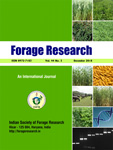ARYA S. NAIR, GAYATHRI G.*, BEENA R., USHA C. THOMAS, PRATHEESH P.GOPINATH, SEEJA G.6 AND AMARESH CHANDEL
Department of Genetics & Plant Breeding, College of Agriculture, Vellayani (Kerala), India
Department of Plant Physiology, College of Agriculture, Vellayani (Kerala), India
Department of Agronomy, College of Agriculture, Vellayani (Kerala), India
Department of Agricultural Statistics, College of Agriculture, Vellayani (Kerala), India
Breeding Partnerships Lead at Bayer Bioscience Private Ltd, Hyderabad, India
*(e-mail: gayathri.g@kau.in)
(Received : 3 March 2025; Accepted 30 March 2025)
SUMMARY
The livestock sector plays a critical role in poverty alleviation and food security through provision of nutritional products and farm inputs. While cowpea (Vigna unguiculata L. Walp) serves as a valuable nutritional resource for both human consumption and livestock feed, its sensitivity to waterlogging presents challenges for sustainable production. Though drought-tolerant, waterlogging induces metabolic, physiological, and morphological alterations in legumes. This investigation evaluated ten cowpea genotypes under controlled and waterlogged conditions. Analysis of biochemical parameters revealed superior antioxidant defense mechanisms and photosynthetic pigment maintenance in genotypes EC240630, IC372130, and PFC-50. Waterlogging significantly affected all measured yield attributes except plant height, with green fodder yield reductions ranging from 23-75% with a mean reduction of 57%. Results demonstrate that waterlogging stress significantly compromises fodder cowpea growth and productivity, with implications for livestock nutrition systems dependent on this protein-rich fodder crop.
Key words: Biochemical, Evaluation, Fodder cowpea, Fodder yield, Waterlogging

